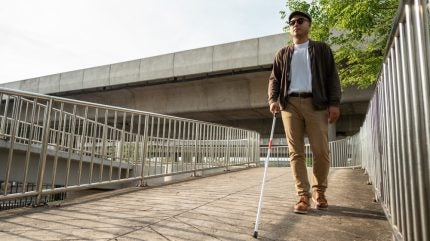

Gene therapy company Skyline Therapeutics has secured an orphan drug designation from the US Food and Drug Administration (FDA) for its retinitis pigmentosa gene therapy, named SKG1108.
There are currently no approved treatments that can halt or reverse photoreceptor degeneration in retinitis pigmentosa, a group of inherited eye disorders that cause progressive loss of vision due to the degeneration of the retina, specifically affecting the photoreceptor cells. This typically begins with night blindness and loss of peripheral vision and can eventually lead to complete blindness.
SKG1108 uses a recombinant adeno-associated virus to deliver DNA directly to the retina. This DNA encodes light-sensitive proteins that can help restore vision by creating new photo-sensing cells, which replace the lost rod and cone cells in patients with advanced retinitis pigmentosa.
Skyline said the treatment is effective regardless of the specific gene mutation causing the condition.
Existing therapies for this rare disease mainly target specific mutant genes that apply only to a small subset of patients. The only approved retinitis pigmentosa therapy on the market is Spark Therapeutics’ Luxturna (voretigene neparvovec), a retinoid isomerohydrolase activator, indicated for patients with confirmed biallelic RPE65 mutation-associated retinal dystrophy.
One of the main players in this field is US-based Beacon Therapeutics. Its lead asset, AGTC-501 (laruparetigene zovaparvovec) is currently in Phase II/III of development for X-linked retinitis pigmentosa (XLRP) in the VISTA trial (NCT04850118) and has shown good efficacy in previous clinical trials. AGTC-501 is highly anticipated as it has the potential to become the first gene therapy specifically indicated for XLRP, according to a GlobalData analyst.
Access the most comprehensive Company Profiles on the market, powered by GlobalData. Save hours of research. Gain competitive edge.

Your download email will arrive shortly
We are confident about the unique quality of our Company Profiles. However, we want you to make the most beneficial decision for your business, so we offer a free sample that you can download by submitting the below form
By GlobalData
Initial data with AGTC-501 showed an improvement in microperimetry measurements, which was also seen in patients who received the highest dose of the therapy in a Phase II study. In July 2024, Beacon secured $170m in a Series B funding round to advance AGTC-501.
China-based Skyline has other ocular disease treatments under its belt, including the gene therapy SKG0106 for neovascular age-related macular degeneration (nAMD). The one-time intravitreally delivered candidate is being evaluated in a Phase I/II clinical trial (NCT05986864) in patients with nAMD.
The nAMD market is expected to reach $27.5bn across the seven major markets (US, UK, France, Germany, Italy, Spain, and Japan) by 2031, according to a GlobalData report.
GlobalData is the parent company of Pharmaceutical Technology.
Cell & Gene Therapy coverage on Pharmaceutical Technology is supported by Cytiva.
Editorial content is independently produced and follows the highest standards of journalistic integrity. Topic sponsors are not involved in the creation of editorial content.

Sign up for our daily news round-up!
Give your business an edge with our leading industry insights.
